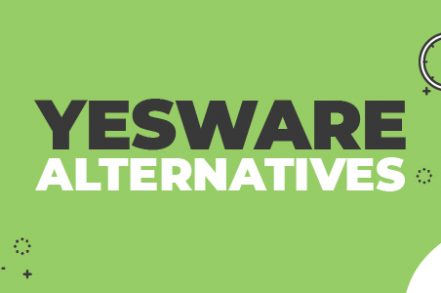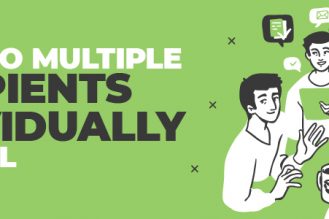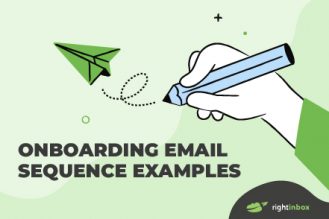Yesware has been around for some time now and has the kind of tools that can make any sales team more productive.
Boasting some excellent features, it’s been a go-to tool for many sales teams in the last ten years or so.
Some of its best features include:
- Email tracking
- Multi-channel campaigns
- Integrated meeting scheduler
- Zoom integration
- Email templates
- Excellent but straightforward reporting dashboards and analytics
- Many integrations with the tools you already use
Although Yesware is undeniably a great tool, you may find that it doesn’t quite work for your business. Maybe the pricing doesn’t fit your budget. Perhaps the features don’t fit your processes correctly.
This happens — it doesn’t mean that the tool isn’t great, it just means it’s not quite the right fit for your business, and that there may be Yesware alternatives that would be better suited to you and your team.
With that in mind, let’s take a look at 10 of the best Yesware alternatives currently on the market:
1. Right Inbox
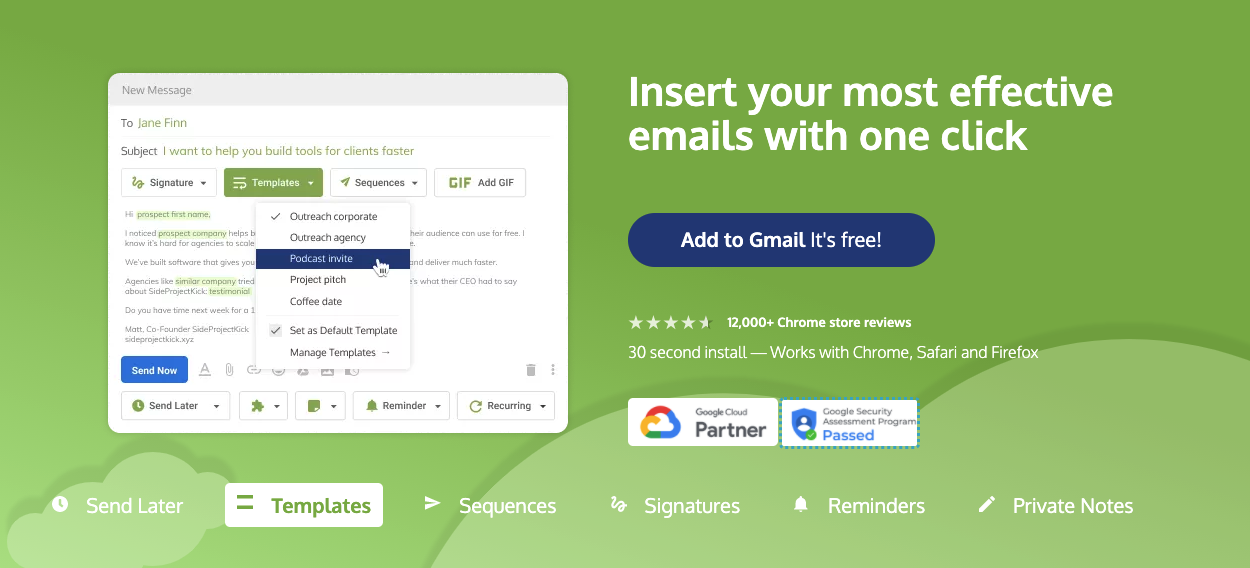
One of the most affordable and intuitive alternatives to Yesware is Right Inbox, which our 250,000 users can attest to. Right Inbox makes staying on top of your emails within Gmail easier than ever.
With pricing starting at $7.95 a month for a yearly subscription and $14.95 if you require all the features. Yesware’s starting price comes in at $15 a month per user. Right Inbox also offers a free version, so you can test the tool before upgrading to get even more features.
Here is a breakdown of some of the features included with Right Inbox:
- Send Later – you can schedule emails to send at a time when your recipient is most likely to open their emails.
- Templates – an intuitive email template feature that can save you from writing the same emails over and over again, and is much simpler than copy and pasting
- Email Tracking – the email tracking feature lets you know who has opened the emails that you’ve sent, when they opened them, and how many times.
- Recurring Emails– recurring emails that you send out can be set to send at regular intervals.
- Signatures – the email signature feature allows you to create as many email signatures as you want.
In addition to these key features, you can also sync Right Inbox to your favorite CRM, add private notes to keep track of essential details of your contacts, and much more. Download for free from the Chrome Store today.
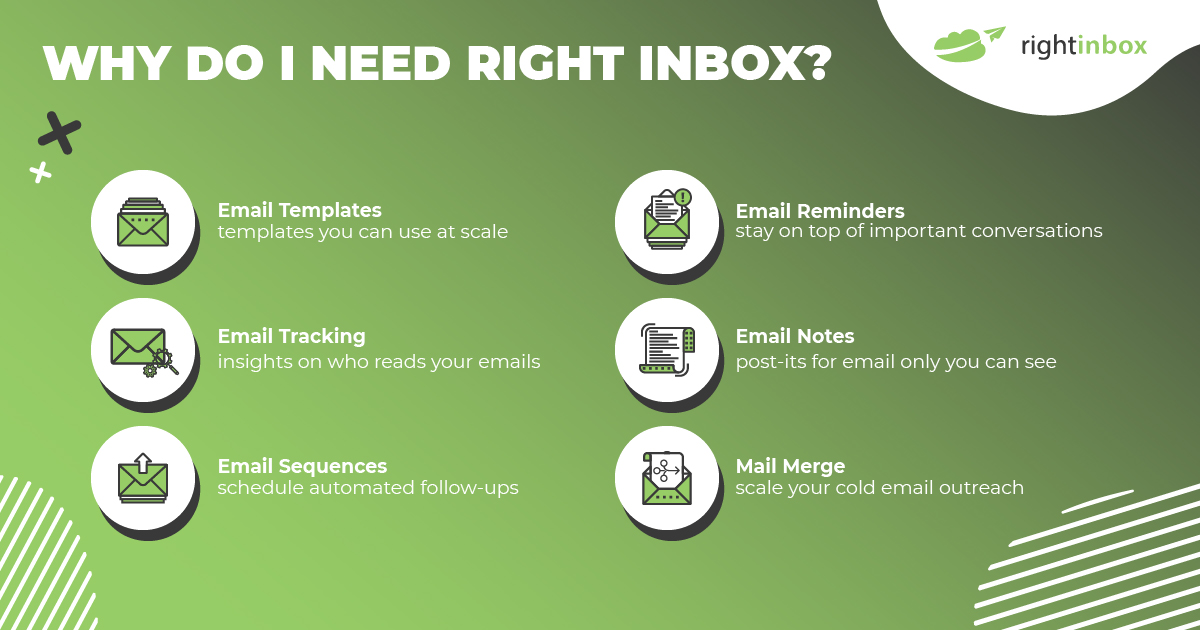
2. Mailshake
While Mailshake hasn’t been around for as long as Yesware, it has made some serious ripples in the industry over the last few years. Mailshake is a complete sales tool suite that is simple to use and connects to many of the sales tools you already use.
Some of the features you’ll get with Mailshake include:
- Split testing so that you can optimize your emails over time
- A social outreach feature that allows for omni-channel outreach – you can be where your potential leads are and reach out to them where they are most comfortable
- A built-in phone dialer to simplify your workflow
- Email tracking that allows you to keep an eye on when your emails were opened, who opened them, and whether they clicked any links that you added to the email
- Integrations connects to the tools that you already use, including G Suite, Outlook, SMTP, Salesforce, Pipedrive, Hubspot, and more
- Integration with Voila Norbert, so you can instantly add email addresses that you find straight into your campaigns. For anyone who spends hours searching for prospect emails, this is a huge time saver.
With such a wealth of features, Mailshake is a serious alternative to Yesware. It empowers you to automate the sales process, save valuable time, and generate more revenue for your business. Pricing starts at $59 a month per user.
3. MixMax
Over the last few years, MixMax has been rapidly expanding its tool – making it another great alternative to Yesware. Whether you work in sales, PR, or marketing, you’ll find value with MixMax.
MixMax offers a free plan, and its starter plan comes in at a reasonable $9 a month.
It also has a wealth of features that include (but aren’t limited to):
- Email tracking
- Notifications
- Phone dialer
- Templates
- One-click meetings
- Send later
- Reminders
- Team chat
MixMax also offers a wide range of integrations with other tools you use, including Salesforce, Pipedrive, Slack, Google Calendar, Twitter, Typeform, and Box.
4. Gmelius
If you want an alternative to Yesware with some great collaboration features, you don’t need to look much further than Gmelius. Because of the way it’s built, Gmelius is suitable for many businesses and workflows, including customer support, project management, marketing, and sales.
Gmeliius has a free plan for up to 3 users and then starts at $9 a month per user – which is very reasonable for the time it will save your team.
But what makes Gmelius unique? How can it help your team? Here are some of the features that you don’t necessarily get in the other tools we’ve mentioned:
- Shared inboxes across your team
- The ability to manage projects inside Gmail
- Task automation to keep you more productive
- The ability to chat with your team inside Gmail
- Sharing and assigning emails across the team
- Meeting scheduler
- Email notes
- Shared Gmail labels
Gmelius is an excellent alternative to Yesware if you prioritize collaboration. It brings all communications into one place so your team will no longer have to waste time swapping from tool to tool to share data, leads, and important messages.
5. Mailtag.io
Another affordable and intuitive alternative to Yesware is Mailtag. With simple pricing of $9.99 a month per user, it’s well within most teams’ budgets.
While it doesn’t have some of the features that some of the other tools have, that can work to its advantage. It’s a particularly good choice for smaller sales teams.
Here are some of the features you can find in Mailtag:
- Email tracking, including open rates and link-click rates
- Email scheduling for sending your emails at the right time
- Auto-follow up
- A handy dashboard for you to track all of your activities
- An intuitive email signature tool
- A team statistics dashboard
- Auto-BCC to your CRM
6. SalesHandy
SalesHand is an advanced cold outreach tool that helps you automate various parts of your digital communications. It’s a personalized approach that comes off as authentic, not spammy.
Some features of SalesHandy include:
- High deliverability
- Automatic followup sequences (up to 10 stages)
- Email warmups
- LinkedIn email finder
Pricing for SalesHandy starts at $25 per month.
7. Klenty
Klenty is a sales engagement software, designed to help you get more engagement and bookings. While it is a multi-channel solution, email is a large part of their offering.
Some of the features you can expect from Klenty include:
- Cadence Playbooks to map out your email strategy
- Liquid templates to personalize your messages for each prospect
- Integrations with HubSpot, Slack and more to achieve a multi-platform strategy
The standard Growth plan begins at $60 per month, whereas Enterprise begins at $100 per month per user.
8. Outreach.io
Outreach helps companies maximize their workflow with a wide variety of productivity oriented features. Outreach guides your reps to keep track of deal flows and ensure no lead falls through the cracks with features like:
- AI dashboard to learn about trends in your company
- Outreach Commit to perform sales forecasting
- Integrations with Gmail, Salesforce, and more
To use Outreach, pricing is on a per-company basis and you need to schedule a quote first.
9. SalesLoft
SalesLoft helps companies take a smart approach to prospecting. It combines calling, emailing, and other sales activities into one CRM.
Some of the better features SalesLoft provides are:
- Cadence feature that helps you time out your emails to nurture prospects better.
- Conversations let you look at what’s being said to coach your team on their email communications.
- Create playbooks that sequence out your emails based on previous deals that closed, so you can emulate what works.
SalesLoft pricing is cutomized, so you need to reach out for a quote.
10. Reply.io
Reply.io is another Yesware alternative out there currently. It aims to be an all-in-one platform for sales engagement. Some key features of the software include:
- Email finder to locate prospects.
- Email warmup to make sure your emails are actually delivered at scale once you ramp up.
- AI Email Assistant to help you identify the elements of converting emails that equate to sales.
Expect to pay $90 per user every month if you start out with the professional plan.
The ten tools mentioned here are some of the best alternatives to Yesware currently on the market. If you’re looking to make a change or need a tool that better suits your team’s needs, then you can’t go wrong with any of these. The most important thing to keep in mind is to make sure that the price matches your budget and that you have all the features you’re going to use daily.
Track emails, email reminders & templates in Gmail for free
Upgrade Gmail with the features it’s missing
Add to GmailDavid Campbell
David Campbell is the editor of the Right Inbox blog. He is passionate about email productivity and getting more done in less time.
